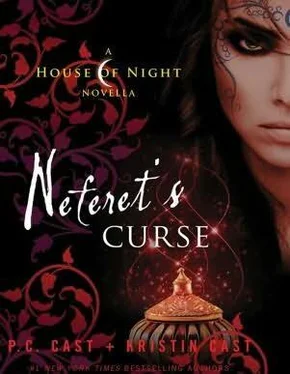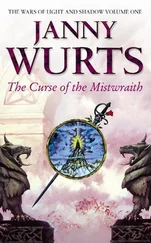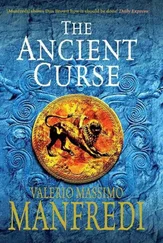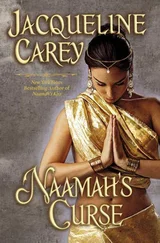Camille’s smooth brow furrowed. “Then you haven’t been ill?”
I snorted. “Not ill of body, but ill of mind and heart. It is as if Father expects me to take Mother’s place in all things.”
Camille fanned herself with her delicate fingers. “I’m so relieved! I thought you might have been struck by the pneumonia. You know Evelyn died of it last week.”
I felt a shudder of shock. “I didn’t know. No one told me. How terrible … how very terrible.”
“Don’t be frightened. You look strong and as beautiful as ever.”
I shook my head. “Beautiful and strong? I feel as if I am one thousand years old, and that the whole world has passed me by. I miss you and I miss my old life so very much!”
“Mother says what you’re doing is more important than the girls’ games we used to play, and I know she must be right—being lady of a great house is very important.”
“But I’m not the Lady of a great house! I am more servant than anything else.” I felt as if I wanted to explode. “I’m not allowed to breathe one bit of freedom.”
Camille tried to put a cheery face on my changes. “It is the middle of April. In two weeks it will be six months since your mother’s death. Then you will be free of mourning and be able to rejoin society.”
“I don’t know if I can even bear two more weeks of everything being so very dreary and so very boring until then.” I’d chewed my lip at Camille’s surprised look, and hurried to explain. “Being the Lady of Wheiler House is a job—a terribly serious job. Everything must be just so—and just so means exactly how Father wants it, which is how Mother had it. I didn’t understand how hard and grim it is to be a wife.” I drew a deep breath and said, “She tried to tell me. That day. The day she died. That is why I was in the birthing room with her. Mother said she wanted me to know what it was to be a wife, and to not go blindly into it as she had. So I watched. Camille, I watched her die in a flood of blood, with no loving husband holding her hand and mourning at her side. That is what it is to be a wife—loneliness and death. Camille, we must never get married!”
Camille had been stirring her tea quite manically while I’d been unburdening myself of thoughts I’d been longing to share with someone. She dropped her spoon at my exclamation. I’d watched her gaze flick nervously to the closed parlor-room door, and then back to me. “Emily, I do not think it is good that you linger on thoughts of your mother’s death. It cannot be healthy.”
I understand now, as I record our conversation, that I had begun to say more than Camille could bear to hear and I should have ended the subject and kept my thoughts to myself and to this, my silent, nonjudgmental, journal. But then all I had wanted was someone to talk with—to share my growing fears and frustrations with, so I continued. “My thoughts must linger on her death. Mother herself wished it so. It was she who insisted I be there. She who wanted me to know the truth. I think, maybe, Mother knew her death was near and that she was trying to warn me—trying to show me that I should choose a different path than that of wife and mother.”
“A different path? Whatever can you mean? Religious work?”
Camille and I had curled our noses together, our minds completely alike in this aspect.
“Hardly! You should see the spinsters from the church who volunteer at the GFWC. They are so drawn and pathetic, like unfed sparrows pecking at the scraps of life. No, I’ve been thinking about the lovely little shops that have opened around the Loop. If I can run Wheiler House, certainly I can run a simple hat shop.”
“Your father would never allow that!”
“If I could make my own way, I would not need his permission,” I’d said firmly.
“Emily,” Camille had said, sounding worried and a little frightened. “You cannot be thinking of leaving home. All sorts of terrible things happen to girls with no family and no money.” She’d lowered her voice and leaned closer to me. “You know the vampyres just moved into their palace. They bought all of Grant Park for their terrible school!”
I’d shrugged dismissively. “Yes, yes, Father’s bank handled the transaction. He’s talked endlessly about them and their money. They call the school a House of Night. Father says it’s completely walled off from the rest of the city and guarded constantly by their own warriors.”
“But they drink blood! They are vampyres !”
I’d been thoroughly irritated that the subject of the miserable state of my life had been overshadowed by one of Father’s clients. “Camille, vampyres are rich. Everyone knows that. They have schools in many American cities as well as the capitals of Europe. They even helped to finance the building of the Eiffel Tower for Paris’s World’s Fair.”
“I heard Mother say vampyre women are in charge of their society,” Camille had whispered while she glanced at the parlor door again.
“If that is true I say good for them! Were I a vampyre, I could choose not to be trapped by my father into pretending to be my mother.”
Camille’s eyes had widened. I’d definitely found a way to turn the conversation back to my troubles. “Emily, he couldn’t want you to pretend to be your mother. That makes no sense.”
“Sense or no, that is how it seems to me.”
“You must look at it with different eyes, Emily. Your poor father simply needs your help through this difficult time.”
I’d felt as if the inside of me was beginning to boil, and I couldn’t stop my words. “I hate it, Camille. I hate trying to take Mother’s place.”
“Of course you would hate feeling like you must make up for your Mother’s absence. I can hardly imagine all that there is for you to do,” Camille had said, nodding somberly. “But when you are the great Lady of a house, there are also jewels to buy and dresses to be commissioned and brilliant parties to host.” She’d found her smile again as she’d poured more tea into my cup. “As soon as you’re out of mourning, all that will be your responsibility, too.” She’d giggled and I’d stared at her, realizing she had no understanding at all of what I was trying to tell her. When I didn’t speak, she went on, chattering happily, as if both of us were carefree girls. “The Columbian Exposition opens in two weeks, just in time for you to be out of mourning. Think of it! Your father will probably need you to host dinner parties for all sorts of foreign dignitaries.”
“Camille, Father won’t allow me to bicycle. He cuts short my visits with you. I cannot imagine him allowing me to host dinner parties for foreigners,” I’d tried to explain, to make her understand.
“But that is what your mother would do, and as you have said, he has made it clear that you inherited her place in the household.”
“He has made it clear that I am trapped to be his slave and his imaginary wife!” I’d shouted. “The only time for myself I can manage are the few minutes I steal with you, and the time I spend in Mother’s garden—and then only at night. During the daylight hours he has the servants spy on me and sends them after me if he’s displeased by where I’m going or what I’m doing. You know that! Even here they come fetch me as if I am an escaped prisoner. Being the Lady of a great house isn’t a fantasy come true—it is a waking nightmare.”
“Oh, Emily! I do hate seeing you so distraught. Remember what Mother said all those months ago—the care you’re taking of your father will make the man who becomes your husband very happy. I envy you, Emily.”
“Don’t envy me.” I saw that the coldness in my voice hurt her, but I could not help myself. “I have no mother, and I’m trapped with a man whose eyes burn me!” I broke off my words and pressed the back of my hand against my mouth.
Читать дальше










